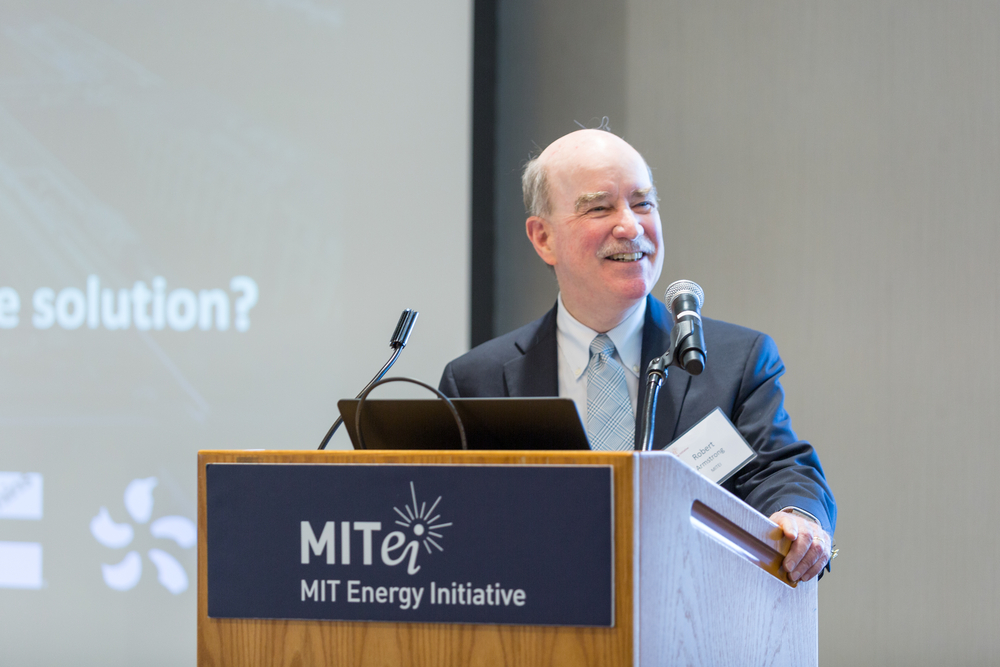
Robert C. Armstrong, the Chevron Professor of Chemical Engineering who has been the director of the MIT Energy Initiative (MITEI) since 2013 and part of MITEI’s leadership team since its inception in 2007, has announced that he will retire effective June 30, 2023. At that time, he will have completed 50 years on the MIT faculty.
Armstrong plans to continue to work at 10% capacity, focusing on research projects on which he serves as principal investigator and also advising a number of graduate students.
“Working at MIT has been a great honor and privilege for me,” says Armstrong. “Nowhere else can I imagine having had the opportunity to work with such exceptional students and colleagues and to have a ‘job’ that makes me want to get up every day to see what I can do to help humanity with its great challenges.”
Armstrong joined the founding MITEI leadership team with Ernest Moniz, now the Cecil and Ida Green Professor of Physics and Engineering Systems emeritus and special advisor to the MIT President. When Moniz left MIT in 2013 to become U.S. Secretary of Energy, Armstrong was named MITEI director.
“MITEI has enabled us to leverage MIT’s great talent base to make significant advances in energy research, education, and outreach,” says Armstrong. “This is an incredibly important and exciting time in energy, and there is much to be done in envisioning and implementing an energy transition that mitigates the worst impacts of climate change, provides energy justly and equitably to those around the world without access or with inadequate access, and improves security of energy supply. I have been honored to do this work with amazing colleagues at MITEI and throughout MIT, and I will be cheering that team on, as it races to reach net-zero greenhouse gas emissions by 2050.”
MIT Vice President for Research Maria Zuber will form a search committee to select the new MITEI director. Zuber has worked closely with Armstrong since she became vice president for research in 2012.
“Anyone who knows Bob knows that he is soft-spoken, but a person of deep conviction,” says Zuber. “He is a master of complexity, an admired educator, a respected leader, and a terrific colleague. During his decade as director, Bob has focused the MIT Energy Initiative on the urgent, daunting challenge of transforming the global energy system to respond to the climate crisis. In the last couple of years, Bob led the creation of MITEI’s Future Energy Systems Center, reflecting his keen understanding that an effective climate response requires integrated analysis and a systems approach—there is no one-fix-all solution. I congratulate Bob on a remarkable career, and I thank him for his half century of dedicated service to MIT.”
Armstrong joined the MIT faculty in 1973 after earning his doctorate in chemical engineering from the University of Wisconsin, Madison. A native of Louisiana, he earned his undergraduate degree in chemical engineering from the Georgia Institute of Technology. He served as chair of the MIT Department of Chemical Engineering from 1996 until joining MITEI in 2007.
“In his fifty years at MIT, Bob has been a truly dedicated educator, researcher, and leader in our department, the Institute, and the field of chemical engineering,” says Paula T. Hammond, Institute Professor and the head of the MIT Department of Chemical Engineering—a successor to Armstrong in that role. “During his time as head, he expertly expanded the breadth and depth of the department’s research and academics while maintaining its high level of excellence. He has served as a thoughtful and proactive mentor to so many of our faculty members, as well as a dedicated teacher and advocate for modernizing chemical engineering curriculum. We are extremely fortunate to have profited from his scholarship and leadership over the past several decades and will continue to benefit thanks to his vision and work toward the future of chemical engineering and energy.”
In 2008, Armstrong was elected a member of the National Academy of Engineering, based on his research into non-Newtonian fluid mechanics, his leadership in chemical engineering education, and his co-authoring of seminal chemical engineering textbooks. He became a fellow of the American Academy of Arts and Sciences in 2020.
He received the 2006 Bingham Medal from The Society of Rheology, which is devoted to the study of the science of deformation and flow of matter, as well as the Founders Award (2020), the Warren K. Lewis Award (2006), and the Professional Progress Award (1992), all from the American Institute of Chemical Engineers.
This article appears in the Spring 2023 issue of Energy Futures.